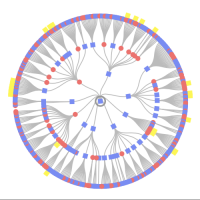Is birth name or final name vital?
I have an ancestor that changed the spelling of his surname, from a double "s" to single. Is it standard that his changed spelling should be the name he is known as, or should that be in alternate names? After reading a topic about German Baptismal names, I'm inclined to put his birth name as an alternate name. But the vital was originally entered with the single s and was changed to the double s, so I'm wondering if FamilySearch has a standard or if I will have to expect this to keep getting changed back and forth willy nilly?
Answers
-
No standards. It's up to you and all your relatives. Just put in the reason statement why you pick the one you do. This is such a minor spelling variant I would hope your relatives have better things to do with their research time than to keep switching it back and forth.
4 -
Yeah, um, echoing Gordon: one 's' or two? That's hardly worth noticing. When he was born Kern and died Szentkirályi, then you need to pay attention. :-)
For whatever it's worth, the general rule of thumb favors the (mythical concept of the) birth name for the Vitals box -- except in the case of legal name changes, such as adoptions or adult sociopolitical decisions.
Really the only "rule" I feel at all strongly about is to please not put married names in the Vitals box, ever. That's just too confusing.
2 -
If a German family was Catholic then the baptismal name tends to be spelled in some variant of Church Latin. Some contributors like to put those alternate spellings in as Alternate names but I find that practice not useful.
I completely ignore s/ss/ß variants because I know FamilySearch has a built-in phonetic algorithm for returning Find and Search results matching names by sound. The algorithm does not yet know about German s vs Hungarian sz, so I may include both spellings. Once I have a good selection of historical records attached to a profile, the hints tool will find any additional records even with differences as extreme as Szentkirályi vs Kern.
0 -
I strongly believe there is no single rule about name changes. The circumstances always dictate, except when they don't. Examples: name change due to marriage, use birth name, not legal name. Name change due to adoption as an infant, use adopted name, ie legal name. Name change as an older child or teenager when mom got a second husband who adopted her children, more difficult. I put both last names when I wonder whether the descendants knew about the adoption. In cases where I have verified that descendants know about the adoption, I use only the legal last name. Name change due to personal preference as an adult, that is where it gets wishy washy. Regardless of whether it was legal or not, significant or not, I tend to use the name most of my relatives knew that person as.
0 -
When the Latin church register has Adalbert for a vernacular name of Béla, then it makes sense to enter an alternate name. (The hinting system may or may not need it, but many of his descendants definitely will.) When it's Johannes versus Johann, then the alternate name is kind of pointless.
I almost always use the new name in the case of adult legal name changes (the ones due to sociopolitical decisions, not the ones due to marriage). I figure that's the most respectful of the person who bore the name.
I agree with Gail's last sentence: for most people, "best-known" is a pretty good tiebreaker.
1 -
If there is a name change connected with immigration, I use the new name as the page title name and record the birth name as an alternate name.
When Johan, Johann etc are abbreviated Joan and the only available historical records have that abbreviation then it definitely is helpful to spell out the name and include a Note explaining how Joan is an abbreviation of a man's name.
1 -
dontiknowyou Yes, I forgot immigration or naturalization. I agree. I also use the new name they chose to take legally during naturalization. I have several of those too. I have German and Danish lines where the Johan(n) seems to be fluid and I do not quite understand all the rules there.
0 -
I agree with you on the name changes. Tiny changes a double letter instead of a single letter, slightly different spellings can be found in many family records and really don't matter that much, the computer is good and finding the variations. My brother (he's still living) changed his name before he married, a radical change. I have have made a note this on the private part of my tree and indicated the changes. I have done this so that in later years someone will know the reason why he no longer uses his birth name. I also have a couple of ancestors who have had a complete change of name (most confusing). How someone adds names and name changes to a tree is obviously up to them, however, I would say it is vital that the change of name is noted. For later generations.
0 -
FamilySearch has an excelent way to handel this situation. In the (Other Information} section you can enter an (Alternate Name), (Also Known As) Birth Name, Married Name, Nickname.
1

